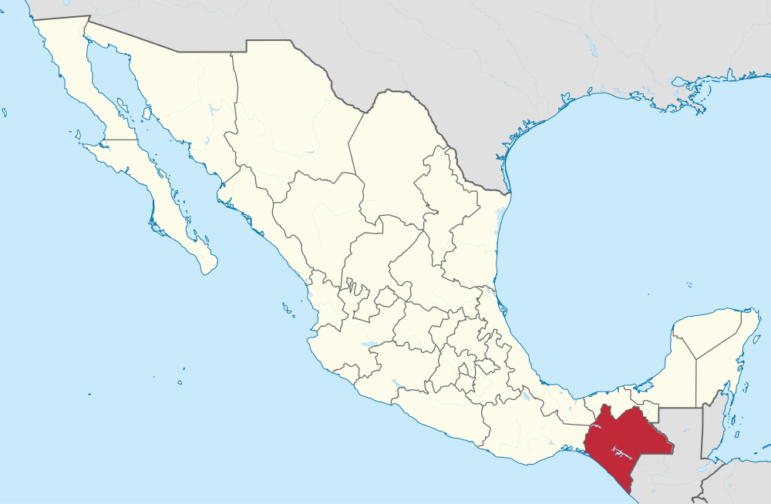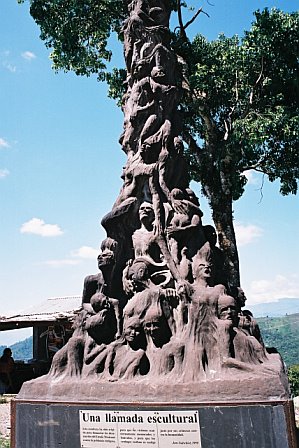MITZITÓN, CHIAPAS, MEXICO – Last Sunday, two families from the Tzotzil tribe attacked and destroyed the houses of five Evangelical Christian families in Mitzitón, a small community just south of San Cristóbal de las Casas in the Chiapas state of Mexico. The attackers are part of a religious tendency called Traditionalist Catholicism, which, despite the name, is a syncretic religion that incorporates elements of Catholicism and the Indigenous Mayan religion. The Evangelical families also appear to be members of the Tzotzil tribe, underscoring how religious strife has led to conflict within Mexican Indigenous communities.
The destruction of these homes is only the latest in a series of violent altercations between Traditionalist Catholics and Evangelicals in Chiapas. Alonso González, who leads an Evangelical group called Alas de Águila (“Wings of an Eagle”), told El Universal that Traditionalist Catholics in the nearby Napite community prevented Evangelicals from building a church in the area last year. El Universal also reports that prior to Sunday’s attack, the local community in Mitzitón jailed two Evangelicals.

Chiapas is located in southern Mexico [TUBS, Wikimedia Commons, CC 3.0]
“Traditionalist Catholicism” refers to a broad set of religious beliefs, traditions, and practices that generally align with Roman Catholicism, but intermingle Indigenous polytheism and practices to form a local syncretic faith.
To the far north of Chiapas near the US border, for example, the Traditionalist Mexican-American Catholic Church breaks away from Roman Catholicism over its veneration of Santa Muerte.
Traditionalists are part of a loosely organized North American denominational movement often called Old Catholicism. This movement adopts and affirms Roman Catholic traditions and theology while asserting independence from Rome. While they are often conservative, Old Catholic denominations can differ widely among themselves and with Rome on issues such as the ordination of women, divorce, and homosexuality.
The Tzotzil are the major Indigenous group around Mitzitón. Scholars believe the tribe’s ancestors have lived in the Chiapas highlands for around two thousand years. The name Tzotzil means “people of the bat.” The tribe resisted the conquistadores fiercely, and while they were eventually politically subjugated, they have maintained an independent spiritual tradition.
“Here, Catholicism couldn’t beat the Mayan religion and its deities,” writes Rulo Luna Ramos for The Matador Network. “The worship of the forces of nature, the animals of the jungle, and the planets in the sky prevailed.
“Behind the collection of saints and virgins in the San Juan Bautista church are Ah Puch, Chaac, Ixchel, Kukulkán, and the whole pantheon of ancient Mayan gods,” adds Ramos. “They have adapted to their new names and now celebrate new festivities, but their true essences remain.”
The Evangelical leader González, however, insists that the actions of Tzotzil represent religious persecution of Evangelical Christians. He claims that Traditionalist Catholics attack Evangelicals because of their refusal to celebrate Catholic holidays or attend traditionalist Catholic community events.
González’s view ignores the long history of persecution experienced by Indigenous people. The Tzotzil specifically have been oppressed for centuries while defending their agency, culture, beliefs, and land. In the late 19th century, for example, Mexican president Benito Juárez stripped the Tzotzil of their land and forced them into debt-indentured servitude.
Missionary efforts by Evangelicals in Indigenous communities raise important questions of autonomy and consent. Evangelism has often gone hand in hand with colonialism, economic exploitation, and the erasure of Indigenous identity. This oppression has fueled resistance to Evangelical Christianity, sometimes violently.
El Universal notes that on June 29, 2014, a group of individuals destroyed ten houses because trees were cut down trees without the permission of the local community. The attackers cited the Sixth Declaration of the Lacandon Jungle, a manifesto of the Zapatista Army of National Liberation that expresses solidarity with the Indigenous communities of the Chiapas. The Zapatista Army is a leftist civil resistance that seeks Indigenous control over local natural resources. The Zapatistas have ostensibly been at war with the Mexican state since 1994.
In May, 2016, Traditionalist Catholics partially destroyed 84 houses, where 350 Tzotzil Evangelicals lived. The Evangelicals subsequently had to leave the Mitzitón community.
“These rural Indigenous groups see Christian churches as an outside force,” said David Curry, president and CEO of Open Doors USA, to The Christian Post. “They can harass and bother churches and believers who might be in the community. It’s within these four states in Mexico: Chiapas, Hidalgo, Guerero, Oaxaca. It’s very localized.” Curry holds that these incidents indicate that persecution of Evangelical Christians has risen in the past year.
Juan Martínez of the Fuller Theological Seminary in Pasadena, California, noted that “the evangelism models of the past created a fundamentally uneven relationship that must be taken into account as evangelicals think about future mission.” While he supports Evangelical activity, he cautions against a practice where Evangelicals “confront indigenous religions through the lens of spiritual warfare.”

Jens Galschiøt’s “Column of Infamy,” which stands at the site of the 1997 Acteal Massacre [MattSoerens, Wikimedia Commons, CC 2.0]
Traditional religious communities in Chiapas have also seen actual warfare enacted against them. The Acteal Massacre of December 22, 1997, saw 45 members of the Tzotzil tribe murdered by 100 armed men during a prayer meeting. The killers were members of the right-wing paramilitary group Máscara Roja (“the Red Mask”). The 45 slain Tzotzil were members of a pacifist resistance group called Las Abejas (“the Bees”), who sympathized with the Zapatistas but rejected violence.
The Mexican government first admitted responsibility for the Acteal Massacre last September. “Accept our solidarity with your causes and our commitment to fulfill our inherent responsibilities,” said Alejandro Encinas, the Mexican deputy interior minister responsible for human rights. “Never again another Acteal.”
Three weeks ago, the Mexican government offered compensation to the survivors of Acetal but it was rejected.
“Fatigue has not defeated us,” Las Abejas said in a statement, pledging to continue nonviolent resistance. “Weariness has not bent us, the blows have not knocked us down, and hopelessness has not seized our hearts.”
While the Acteal Massacre and its aftermath may not have directly contributed to the conflict between the Traditionalist Catholic and Evangelical members of the Tzotzil tribe, it demonstrates the long history of attempts to subjugate and erase Indigneous identities in Chiapas – and may explain why some Tzotzil have chosen such drastic action in defiance of that erasure.
The Wild Hunt is not responsible for links to external content.
To join a conversation on this post:
Visit our The Wild Hunt subreddit! Point your favorite browser to https://www.reddit.com/r/The_Wild_Hunt_News/, then click “JOIN”. Make sure to click the bell, too, to be notified of new articles posted to our subreddit.